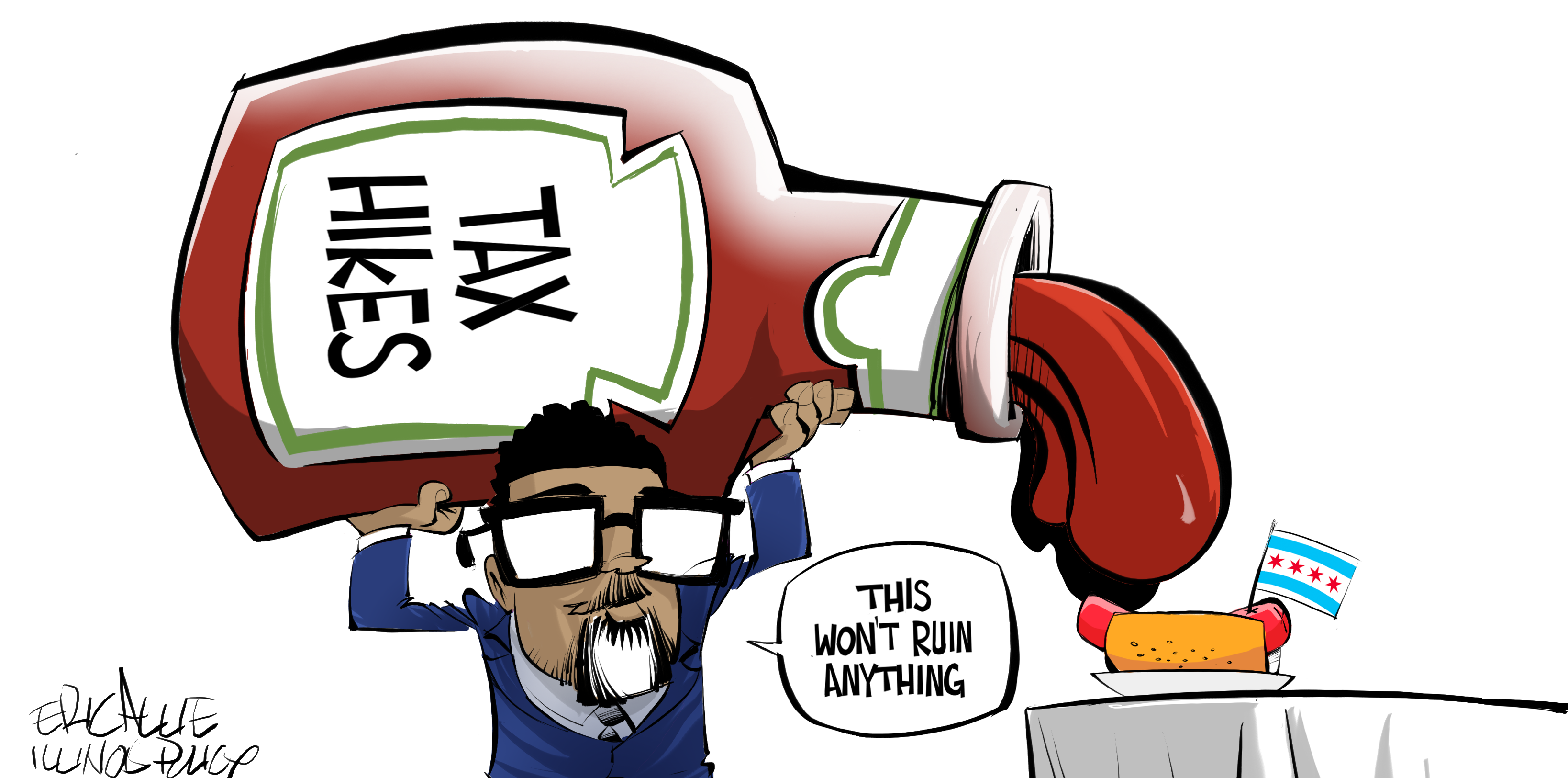The Policy Shop: What are Mayor Brandon Johnson’s political allies thinking?
This edition of The Policy Shop is written by policy analyst Justin Carlson.
“First We Get The Money” sounds like the title of a pretty dope, 1990s rap album.
It’s not. It’s the name given to what’s intended to be a serious academic paper detailing the various means the city of Chicago can deploy (taxes, taxes, taxes) to extract as much money as possible from the people who live there.
One of the centerpieces of the proposal, which includes 17 fun ways Chicago can squeeze business owners and residents, is a plan to slap households making $100,000 or more with a new citywide income tax of 3.5%. The authors, one of whom Mayor Brandon Johnson appointed to his transition team, believe a household earning $100,000 in Chicago is “wealthy.” It’s worth noting a recent SmartAsset report found $100,000 in Chicago is worth about $59,000 after taxes and adjusted for cost of living. But I digress.
Let’s look at some of the goodies in this grab bag of fun and talk about the real risks of city leaders pursuing a tax-hike focused strategy to fix Chicago’s finances (Spoiler: It’s not a good idea).

A “mansion tax.” “First We Get the Money” calls on Johnson to implement the Bring Chicago Home ordinance, which would increase the real estate transactions tax on sales worth more than $1 million by 1.9 percentage points, bringing the total real estate transfer tax rate to 3.1%. Authors claim this would create $163 million in new revenues for the city. Johnson campaigned on this tax.
An increase in the real property transfer tax rate would apply to commercial and industrial real estate as well. The tax would add millions to many commercial property sales in the city, which experts say would be passed on to tenants in the form of higher rent prices at a time when office vacancy downtown is at a record high. For residential properties, the tax would likely serve to reduce home prices as buyers must account for the increased cost of the transfer tax. Home sales and prices within the city are already in decline.
We’re already getting a live look at how massive increases in real estate transfer taxes work, as Los Angeles’ new real estate transactions tax on property sales over $5 million took effect in April. Reports indicate homeowners have been scrambling to get inventory off their hands in the weeks and months leading up to the new tax. Meanwhile, Los Angeles property records indicate numerous institutional lenders have not issued a single construction loan for a multifamily or commercial project since voters approved the new tax in November. A smaller number of available lenders means it is more difficult for potential borrowers to get favorable terms to proceed with projects, placing further strain on the supply of housing and driving up rent prices.
Data already suggests the high-end real estate market is cooling in Chicago. Because the tax would affect multi-family real estate, it would likely drive up rent prices – which are already at all-time highs – for many Chicagoans.
Bringing back the Chicago head tax. The plan calls on Johnson to restart the city’s head tax “to make large corporations pay what they owe for benefitting from the city’s public infrastructure.” It claims the head tax should be $33 per employee annually and it would generate an additional $106 million in tax revenue. Johnson’s campaign platform included a head tax.
Revenues from a head tax are overstated as the report lobbies for an annual head tax of $33 and alleges such a tax would generate $106 million annually. That’s wrong. To get to $106 million, employers would need to pay $33 per employee each month – not each year – for a total of $396 a year per worker, as was estimated for a previously-filed head tax proposal.
Chicago has already conducted a head-tax experiment. The city had a $4-per-month head tax until former Mayor Rahm Emanuel dismantled it in 2014. It consistently underperformed revenue expectations and Emanuel dubbed it a disaster for economic growth. Aldermen called the tax a “job killer” and Emanuel said, “Eliminating the head tax is the right thing to do for businesses big and small, and it’s the right thing to do to secure Chicago’s future.”
To generate the revenue proponents are promising, the tax would need to be more than 8 times larger than Chicago’s old $4-per-month “job killer.”
First We … Fix the Pensions? The real reason the city is constantly scrambling for more tax revenue (e.g., other people’s hard-earned money) is because Chicago is sitting on a sinkhole of public debt, thanks to its $48 billion public pension crisis. In fact, Chicago’s four city-sponsored pension systems – municipal, laborers, police and fire – plus the Chicago Teachers’ Pension Fund hold more debt than 44 states. Yikes.
Stop the squeeze. As mentioned above, it’s getting more expensive to live in Chicago. More taxes won’t help that, and we need to reverse Chicago’s outflow of people – not accelerate it with tone-deaf tax hikes.
Chicago lost 32,990 residents from July 2021-July 2022, the second-most of any city in America. Only New York City lost more people than Chicago during 2022.
An Illinois Policy Institute survey conducted by Echelon Insights Feb. 15-19 found 34% of Chicagoans would leave the city if given the opportunity, citing taxes and affordability as their No. 2 concern behind crime.
In their open responses, 39% cited the city’s near nation-leading taxes and the high cost of living as their main reason for wanting to leave.
Time to rethink those tax proposals, Mr. Mayor.